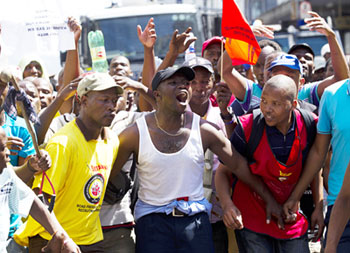

Vol. 76/No. 37 October 15, 2012

|
| Reuters/Rogan Ward |
| Striking truck drivers march in Durban, South Africa, Sept. 26. Victorious strike by platinum miners has sparked other strikes involving some 100,000 workers across the country. |
“The cost of living is very high, the cost of transportation, accommodation, food and health is very high and living conditions and public services for the working class are pathetic,” Vincent Masoga, spokesperson for the South African Transport and Allied Workers Union, which organizes the drivers, told the Militant in a phone interview Sept. 29. “The challenges of the miners and the truck drivers are the same.”
The Lonmin miners’ strike was “an unprotected [wildcat] strike,” Masoga said. “It did not have any impact on our strike, which is a protected [legal] one. But because they won a double-digit wage increase it has made it clear that it is possible to get a decent wage.”
The South African daily Business Day Live reported Sept. 28 that more than 40 percent of the country’s gold mines are shut down from the wildcat strikes.
Some 400 strikers at the Samancor Chrome mine in Rustenburg, in the North West province, began an underground sit-in Sept. 27 to demand a basic salary of 12,500 rand ($1,500) a month. Mametlwe Sebei, a spokesperson for the miners’ committee, told the Mail and Guardian that management had closed off the water supply “in an apparent move to starve and dry out the workers.”
The workers ended their sit-in the next day, but vowed to continue the fight for higher wages.
The bosses at the Gold Fields Mine in Carletonville evicted 2,000 striking miners from company housing. The workers reassembled on a hill near the mine entrance with few belongings but the clothes on their backs, still refusing to go back to work.
The workers were using their residences “as a base to plan and coordinate unlawful and life threatening activities in support of the illegal strike,” Gold Fields spokesperson Sven Lunsche complained to Fin24, a South African news agency.
The strikes at Anglo American Platinum spread to another one of its mines Oct. 2, this time in Limpopo province. The company is threatening to fire the strikers.
Some of the mining companies say that if they give in to the wage demands they will have to close down some of the mines. “It would mean job losses,” AngloGold chief executive Mark Cutifani told the London Financial Times, claiming the industry was losing money and was on a “knife edge.”
Zwelinzima Vavi, general secretary of the Congress of South African Trade Unions, blamed concessions by the mine bosses for the surge in wildcat strikes. He told Business Day Live it was a “grave error” to give in to the workers’ demands outside the contracts and negotiating process previously agreed to by the leadership of the National Union of Mineworkers.
The strikers have ignored pleas from the NUM leadership and other mine union officials to go back to work.
Meanwhile, a government commission appointed by President Jacob Zuma after widespread public outrage over the Aug. 16 slaughter of 34 Lonmin strikers by police at the Marikana mine began its investigation. The outcry had increased support for the strike.
When the commission visited the massacre site, nearby residents marched to the scene singing and chanting and carrying signs that said, “Don’t let the police get away with murder.”
Related articles:
Thousands of workers clash with guards at iPhone plant in China
Black workers in Chicago march for jobs
Front page (for this issue) |
Home |
Text-version home